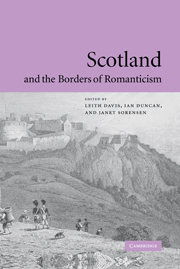Book contents
- Frontmatter
- Contents
- List of contributors
- Acknowledgments
- Introduction
- 1 Coleridge, Hume, and the chains of the Romantic imagination
- 2 The pathos of abstraction: Adam Smith, Ossian, and Samuel Johnson
- 3 Antiquarianism, the Scottish Science of Man, and the emergence of modern disciplinarity
- 4 Melancholy, memory, and the “narrative situation” of history in post-Enlightenment Scotland
- 5 Scott, the Scottish Enlightenment, and Romantic Orientalism
- 6 Walter Scott's Romantic postmodernity
- 7 Putting down the Rising
- 8 Joanna Baillie stages the nation
- 9 William Wordsworth and William Cobbett: Scotch travel and British reform
- 10 Burns's topographies
- 11 At “sang about”: Scottish song and the challenge to British culture
- 12 Romantic spinstrelsy: Anne Bannerman and the sexual politics of the ballad
- 13 “The fause nourice sang”: childhood, child murder, and the formalism of the Scottish ballad revival
- Index
6 - Walter Scott's Romantic postmodernity
Published online by Cambridge University Press: 22 September 2009
- Frontmatter
- Contents
- List of contributors
- Acknowledgments
- Introduction
- 1 Coleridge, Hume, and the chains of the Romantic imagination
- 2 The pathos of abstraction: Adam Smith, Ossian, and Samuel Johnson
- 3 Antiquarianism, the Scottish Science of Man, and the emergence of modern disciplinarity
- 4 Melancholy, memory, and the “narrative situation” of history in post-Enlightenment Scotland
- 5 Scott, the Scottish Enlightenment, and Romantic Orientalism
- 6 Walter Scott's Romantic postmodernity
- 7 Putting down the Rising
- 8 Joanna Baillie stages the nation
- 9 William Wordsworth and William Cobbett: Scotch travel and British reform
- 10 Burns's topographies
- 11 At “sang about”: Scottish song and the challenge to British culture
- 12 Romantic spinstrelsy: Anne Bannerman and the sexual politics of the ballad
- 13 “The fause nourice sang”: childhood, child murder, and the formalism of the Scottish ballad revival
- Index
Summary
In 1884 “The Art of Fiction” was not what it was in 1819, or what it would become in the late twentieth-century aftermath of Henry James's celebrated Modernist manifesto. For James the art of fiction is unam, sanctam, catholicam, as is clear in his dismissal of the distinction, authoritative since Scott, between novel and romance. “I can think of no obligation,” James writes, “to which the romancer would not be held equally with the novelist.” And why? Because the issue is a craft issue: “the standard of execution is equally high for each [and] it is of execution we are talking” (“The Art of Fiction,” 56). Fair enough, one thinks. But when we recall what James says about Trollope in the same essay, we realize there are many rooms in the house of fiction, not all of them to James's fastidious taste:
Certain accomplished novelists have a habit of giving themselves away which must often bring tears to the eyes of people who take their fiction seriously. I was lately struck, in reading over many pages of Anthony Trollope, with his want of discretion in this particular. In a digression, a parenthesis or an aside, he concedes to the reader that he and his trusting friend are only “making believe.” He admits that the events he narrates have not really happened, and that he can give his narrative any turn the reader may like best. Such a betrayal of a sacred office seems to me, I confess, a terrible crime [and] it shocks me every whit as much in Trollope as it would have shocked me in Gibbon or Macaulay. It implies that the novelist is less occupied in looking for the truth … than the historian, and in doing so it deprives him at a stroke of all his standing room. To represent and illustrate the past, the actions of men, is the task of either writer, and the only difference that I can see is, in proportion as he succeeds, to the honour of the novelist, consisting as it does in his having more difficulty in collecting his evidence …
(46–7)- Type
- Chapter
- Information
- Scotland and the Borders of Romanticism , pp. 113 - 129Publisher: Cambridge University PressPrint publication year: 2004
- 3
- Cited by



